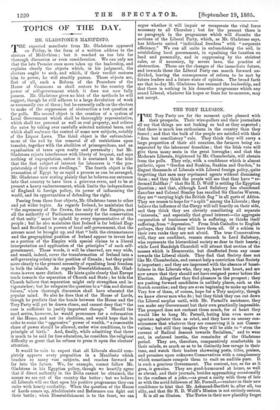TOPICS OF THE DAY.
MR. GLADSTONE'S MANIFESTO. THE expected manifesto from Mr. Gladstone appeared on Friday, in the form of a written address to the electors of Midlothian ; but it reached us too late for thorough discussion or even consideration. We can only see that the late Premier once more takes up the leadership, and explains clearly the objects which, in his judgment, the electors ought to seek, and which, if their verdict restores him to power, he will ateadily pursue. Those objects are, first of all, such a Reform of the Procedure of the House of Commons as shall restore to the country the power of self-government which it does not now fully possess. Mr. Gladstone gives no hint of the methods he will suggest, though he still adheres to a large devolution of work as necessarily one of them ; but he earnestly calls on the electors to make of the suppression of obstruction a test question at the polls. His second object is the creation of a system of Local Government which shall be thoroughly representative, which shall tax personal as well as real property, and relieve the rates by taking over carefully selected national taxes, and which shall embrace the control of some new subjects, notably of the Liquor Laws. The third object is the enfranchise- ment of the soil by the removal of all restrictions upon transfer, together with the abolition of primogeniture, and an equalisation of taxes upon realty and personalty ; but Mr. Gladstone rejects interference with liberty of bequest, and says nothing of expropriation, unless it is contained in the hint that the first subject of interest for labourers is " the pro- prietorship of their own dwellings." The fourth object is the evacuation of Egypt by as rapid a process as can be arranged, Mr. Gladstone now stating plainly that he believes our entrance into that country to have been a grievous error, and to be at present a heavy embarrassment, which limits the independence of England in foreign policy, its power of influencing the world, and its opportunities of defending the right.
Passing from these four objects, Mr. Gladstone turns to other and yet wider topics. As regards Ireland, he maintains that "the supremacy of the Crown, the unity of the Empire, and all the authority of Parliament necessary for the conservation of that unity" must be upheld by every representative of the people ; but he also maintains that Ireland is far behind Eng- land and Scotland in powers of local self-government, that the arrears must be brought up, and that "both the circumstances and the geographical position of Ireland appear to invest her as a portion of the Empire with special claims to a liberal interpretation and application of the principles" of such self- government. These words, it will be observed, are very wide, and would, indeed, cover the transformation of Ireland into a self-governing colony in the position of Canada ; but they point more clearly to the present necessity of equalising local freedom in both the islands. As regards Disestablishment, Mr. Glad- stone is even more distinct. He hints quite clearly that Europe tends towards the separation of Church and State ; he bids the Church believe that separation might only strengthen and in- vigorate her; but he relegates the question to a "dim and distant future," when thorough discussion shall have educated the popular mind. So also he does that of the House of Lords, though he predicts that the bonds between the House and the Tory Party will yet be drawn closer, and cannot deny that" the case is sufficient to justify important change." Should the need arrive, however, he would pronounce for a reformation of the House, and not its abolition, and would hope that in order to resist the " aggressive " power of wealth, "a reasonable share of power should be allowed, under wise conditions, to the principle of birth." And, finally, while admitting that there is much to be said for free education, he considers the religious difficulty so great that he refuses to press it upon the electors' attention.
It would be vain to expect that all Liberals should com- pletely approve every proposition in a Manifesto which touches so many vast subjects, and reaches forward so far into the future. We, for example, cannot follow Mr. Gladstone in his Egyptian policy, though we heartily agree that if direct authority in the Delta cannot be obtained, the sooner we are out of the country the better ; but we believe all Liberals will see that upon his positive programme they can unite with hearty cordiality. When the question of the House of Lords comes up, Abolitionists and Reformers can fight out their battle ; when Disestablishment is to the front, we can argue whether it will impair or recuperate the vital force necessary to all Churches ; but for the present there is no paragraph in the programme which will disunite the sections of the Liberal Party, which, as Mr. Gladstone says, has hitherto united "individual freedom" with "corporate efficiency." We can all unite in enfranchising the soil, in establishing local government, in equalising the taxation on land and personalty, and in suppressing by the strictest rules, or if necessary, by severe laws, the practice of obstruction. Those are the changes of the immediate future, and towards those the Liberal Party can march forward un- divided, leaving the consequences of reform to be met by future leaders and a future state of opinion. The broad facts are that to-day Mr. Gladstone has resumed the leadership, and that there is nothing in his domestic programme which any sound Liberal, whatever his hopes or fears for to-morrow, may not accept.


































 Previous page
Previous page